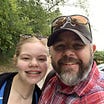[Editor’s note: The following was written by Adam Tisdale for Greatheart’s Table. For some time I’ve appreciated Adam’s realistic invitation to joy in his newsletter Double the Joy where he encourages his readers, me among them, to be grateful for small things, which are, he helps us see, really the big thing. Adam has been the pastor of North Hills Church in Meridianville, Alabama since 2009. In his spare time he does some remarkable things with stained glass.]
I am a farmer.
But not if you ask my wife. She scoffs playfully and questions my expertise.
Granted, I have been wrong a time or two when trying to guess what crop is currently growing in the fields adjacent to our neighborhood and nearby county roads. The crops in those fields rotate between soy beans, corn, and cotton. I proudly proclaim my guess in the early days of a crop and one might suggest I have a 33% chance of being correct. Or, more likely, a 66% of being incorrect. A true farmer, she argues, would know.
Though I do now own a John Deere tractor, it’s a bit smaller than those I often see in our rapidly changing community. Here the fields now grow year round crops of homes and new neighborhoods. So I do understand my wife’s argument. As the firm product of a middle-class suburban family there are a number of other things I associate with farming that I don’t like to do. I don’t like to wake up early, garden, or participate in other outside yard endeavors unless strictly necessary, especially during growing season in north Alabama. The closest I will likely ever get to farming is through my (apparently limited) powers of observation on my way to and from my home. I think it’s cotton that’s growing now. It could be soybeans. Time will tell.
Some kind of farmer, right? But I remain bold and brash in my claim that I am a farmer, even in my wife’s hearing. Of this fact I am certain.
When Paul, at the end of his life, writes to Timothy to prepare him for a lifetime of pastoral ministry, he uses several images to give color to that preparation. Together with “soldier” and “athlete” he tells Timothy that “It is the hard-working farmer who ought to have the first share of the crops.”1
There it is. Paul likens the pastor, in this case Timothy, to a farmer. This is set for Timothy in a particular context of suffering (ever present for the pastor) and endurance (ever needed) in ministry.
So, yes, like Timothy, I am a farmer after all. I don’t farm a large tract, though there have been plenty of times that I have longed to do so, when I have thought I was made for better things than a small family farm. Maybe I could get a new plow or try some new crops if I had a mega-farm or even just a medium sized one. There have been plenty of times I imagined that my field should be enlarged.
This all is an exercise in missing the point, at the very least. The focus of Paul’s words is not on the size of the farm, but on the promise of the harvest to come. Jesus reminds us in the gospels2 that God, not the farmer, is sovereign over the harvest.
So, as I enter my sixteenth year in my current call to a small Presbyterian church, I do so remembering three fundamental farming perspectives which remain true for all farmers, regardless of the size or nature of their particular farms.
1. Hand to the Plow
This is my most frequent description of my ministry. I am a plodder with my hand to the plow. Day after day. “Methodical” is how I have been described by others, which certainly doesn’t put me in the category occupied by my charismatic and uber-gifted colleagues. But when suffering comes (and as one who has faced cancer twice at a young age, I can say it does and will), our ability to stay focused and steady on the task the Lord has given us matters more than ever. So, every day, I seek to put my hand to the plow in this field in which I have been placed.
2. Heart focused on the Promise
The disconnect in my heart is often found in the gap between what I think the Lord should promise (and in a moment of honesty — what I think I deserve in ministry) and what he has actually promised. So, I must, repeatedly, return to the promise of the true harvest of the Lord rather than the harvest my flesh often desires.
3. Head looking up for Fulfillment
It is hard to keep a straight line if your eyes are focused on your feet. And like farmers say everywhere, watched crops never grow. Okay, I don’t know if they actually say that. But we have to risk raising our eyes beyond ourselves and our fields to see the faithful fulfillment of the Lord of the harvest. We need to recalibrate our hearts and train our eyes to look for something beyond what we can see in the moment.
This is hard work. But it is Christ’s work. And the Spirit is producing growth day by day, whether I see it or not.
Turns out, I am a farmer.
I cannot wait to tell my wife.
2 Timothy 2:6
This passage was brought to my attention, afresh, through my reading of Jonathan Dodson’s encouraging book for pastors, The Unwavering Pastor: Leading the Church with Grace in Divisive Times, (United States: Good Book Co., 2022).
When you buy a book using a link on this page, Greatheart’s Table receives a commission. Thank you for supporting this work!
Matthew 9:38




Nice post. Perfect length. Whimsical. Enjoyable. I liked the exegesis. Thank you!